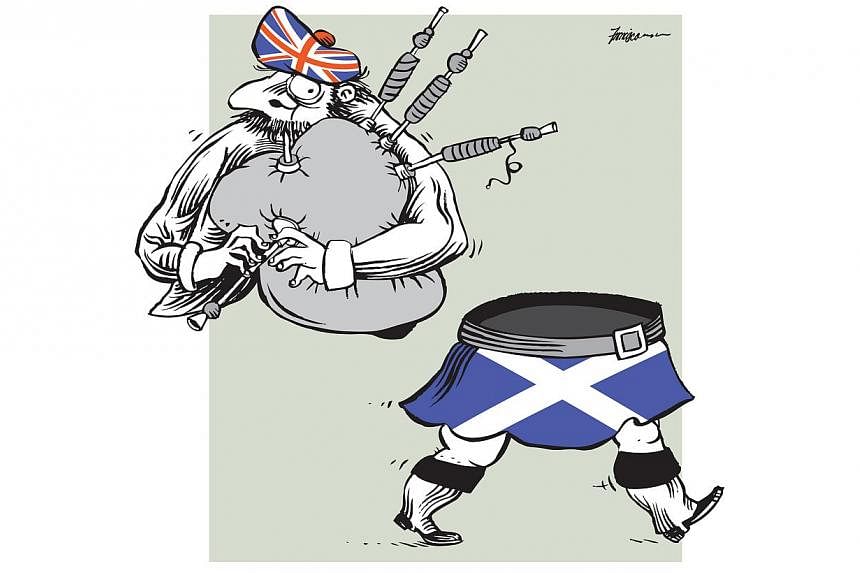I have a favourite anecdote about Scottish sovereignty that includes David Beckham and a flying shoe.
It comes straight from my time at The Scotsman, one of the country's leading broadsheets, and it helps illustrate how passionately Scots feel about this independence referendum, their peculiar relationship with their next-door neighbour; and, why Britain might be wiped off the map next Thursday.
In the summer of 2002, I worked as a freelance journalist in Scotland. I would shuttle between Glasgow and Edinburgh's rival mastheads, The Herald and The Scotsman, about three times a week. You could catch me eating chips on the Royal Mile as I headed down the famous cobbled high street to the illustrious newspaper offices of The Scotsman.
One June evening, I was sub-editing the sports pages when the news came on. The lead story being covered with great drama was that England had beaten Argentina 1-0 to qualify from their World Cup group, thanks to a penalty kick from none other than Beckham. It was a toxic combination.
From behind me, an editor took his sweaty shoe off and hurled it at the TV screen, smashing it against the frame of the set, leaving it wobbling on its metal support. He then marched towards the TV set and yelled: "Why are you covering this f***ing story? This is Scotland."
There is this acronym in Scotland for deciding who to support in major sports competitions: ABE - Anyone But England.
That summer, Glasgow sold out of Sweden and Argentina shirts - both group opponents of England. When England were knocked out by the Samba boys, horns blared from cars all down the city's busy Sauchiehall Street, Brazil flags flying from sun roofs. At the Daily Record, Scotland's main tabloid, some of my fellow journalists turned up to work in Brazil shirts.
Sport in many ways is the ultimate display of nationalism - and Scotland has never really been able to project its biggest wins as its own.
From the 100m gold medal won in the boycotted 1980 Moscow Olympics by Scotland's Allan Wells, to the women's curling team at the 2002 Winter Games in Salt Lake City, to Andy Murray's 2013 Wimbledon title, and the countless medals won by Scottish cyclists at the 2012 London Olympics, Scottish sovereignty has always been most tested when sharing wins with the English under the British flag.
The Sept 18 referendum will put an end to that problem, if a voting population of 4.1 million decides to harpoon its 309-year union with Britain and go it alone.
A year ago that would have been fanciful, even laughable. There never looked like any danger of Scotland seceding from Britain - an aggregate of polls showed a 40 per cent gap between the "No" and "Yes" campaigns in May last year. Up until this week, the "No" campaign maintained a healthy lead.
Something viral - and visceral - has happened. Among my Scottish family (my mother is Scottish) there have been several conversions from "No" to "Yes" in the past year; it looks likely now that a majority are poised to cut the apron strings. A year ago my cousin was a firm "No"; today she is a palpably excited "Yes". Her journey looks to have been copied all over Scotland, among young and old. "It's exciting, for once you can have a debate with folk about proper issues," she said.
This is a huge tectonic shift for Britain if it happens. "Yes" means automatically losing about a third of its landmass and about a tenth of its people; British politics will be permanently transformed - Labour, a major political party, will lose more than 40 parliamentarians - and an unprecedented brand re-evaluation will begin.
Other repercussions have already been sorted out - the English won't be forced to flash their passports when they cross the border with Scotland - and an independent Scotland will enter its own team in the Eurovision Song Contest next year.
The last few days of campaigning will continue under the same themes - how independence will affect Scotland's economic future: currency issues, European Union membership status, National Health Service spending, rising national security threats, the location of Scotland's nuclear arms.
A lot has been thrashed out in televised debates. All three main political party leaders - Mr David Cameron, Mr Nick Clegg and Mr Ed Miliband - have cleared their diaries to try desperately to dissuade the Scots from voting "Yes".
But why have so many people changed their minds? There is something "heart over mind" in the dramatic narrowing of recent polls: the economic arguments have given way to a national catharsis of finally being able to hit the kill switch - "Tick this box and everything will remain the same" or "Tick this box to have a country of your own".
Can anyone really begrudge a nation its sovereignty - a chance to write its own story?
There is very little that divides Brits. Yes, there is a "humoured" hatred of the English. Britain consists of different nations with a mixture of peoples and cultures under one conceptual umbrella (which is now looking a bit weather beaten).
But I will say this: our commonalities far outweigh our differences. Unfortunately, that may not be enough to keep us all together.
The writer is a freelance writer living in Singapore.

